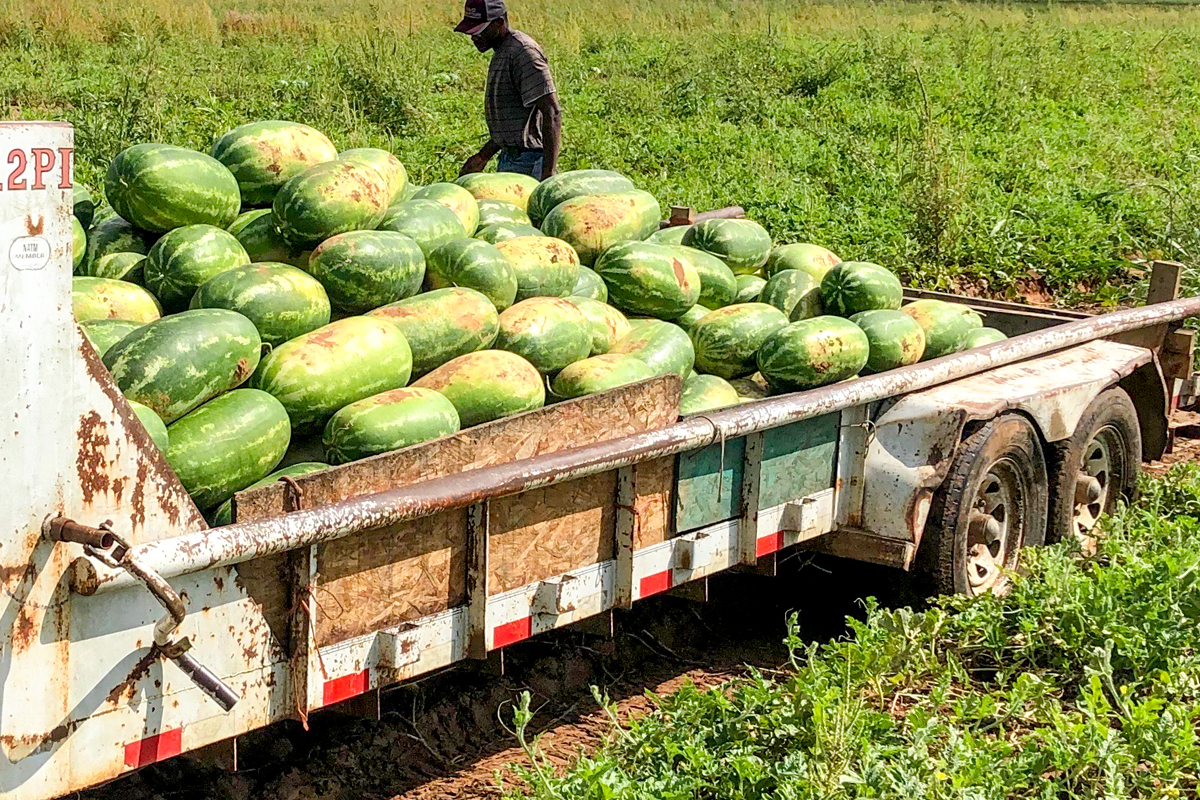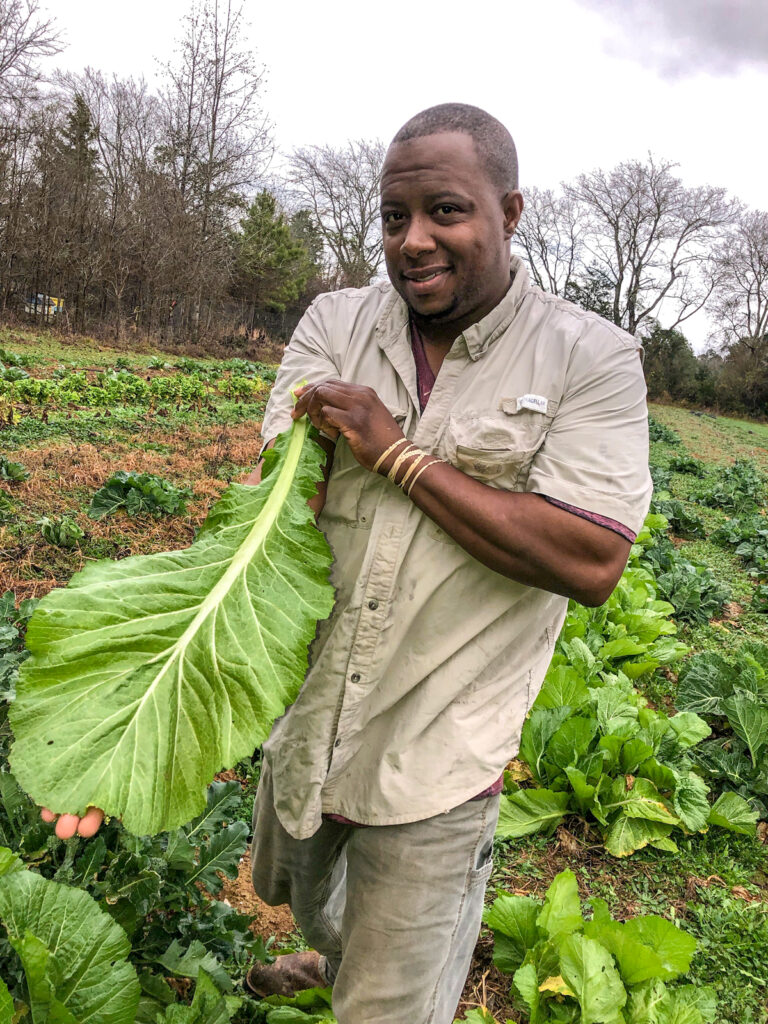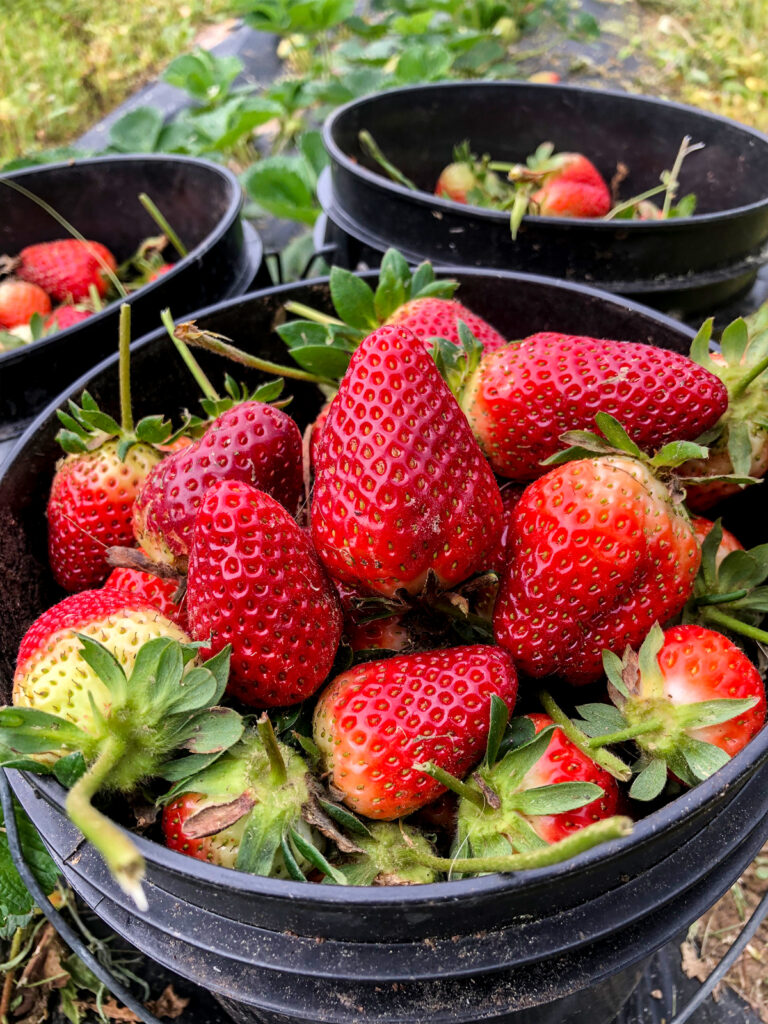
06 May Rural black farmers like Courtney McCurry find friend in F.A.R.M.S.
Courtney McCurry picked up farming about 12 years ago as a way to honor his late father, Donald.
McCurry was into showing his 150 angus-bred cattle and had a day job, but his dad kept urging him to purchase some acres and grow crops that he could sell. McCurry always said no — until he had to harvest his dad’s last crop of peas and quickly learned that he could use his hands to make a lucrative living.
“My uncle asked me after the funeral, ‘Courtney, are you going to tend to your daddy’s last crop?’ So I got on the tractor and started cultivating his peas and fooled around and fell in love with it,” he said.
Today, McCurry, 38, has a 48-acre farm in Jefferson, Texas and harvests a diverse set of crops that include watermelon, cantaloupe, tomatoes, peas, beans, corn, onions and potatoes. He owns two vegetable stands and takes his veggies to three farmer’s markets in east Texas cities like Longview and west Louisiana on weekends.
McCurry estimates that he produces at least 200,000 pounds of crops each year.
The farming business has blessed McCurry with the funds to build his own home, pay off his vehicles and provide for his growing family. McCurry and his wife Kendra have two children, Courtney Jr., 2, and Addison, 1, that he hopes will follow him into the farming business as well.
He encourages other black people interested in the business to take the leap — they just need to have the right mindset and be ready for long hours and hard work.
“Have patience. Well first, trust in God, have patience and listen to the plants,” he said. “The plant will tell you what he wants.”
However, he said learning from mentors and receiving support from organizations like F.A.R.M.S has been instrumental to his success.
Family Agriculture Resource Management Services is a black-owned national nonprofit dedicated to reversing small farmland loss to ensure generational wealth and reduce hunger in rural low-income communities. F.A.R.M.S. legal and technical assistance to farms in addition to its hunger relief effort in rural communities.
F.A.R.M.S., is the brainchild of lawyer Jillian Hishaw, which provides legal services to farmers facing discrimination, often in regards to predatory lending practices and purchases unsold crops to donate to food banks. F.A.R.M.S. has purchased nearly 700,000 pounds of produce nationwide and dispersed over $35,000 in emergency stipends to farmers to pay for legal fees, medication, past due property tax, utilities and more to ensure black farmers retain their land.
The work is personal for Hishaw, who was awarded a $5,000 grant from We Buy Black and Shea Moisture this spring as part of its $100,000 Black Business Relief Fund for COVID-19. The money will be used to provide black farmers with the immediate financial support to pay for utilities, seed and fertilizer to ensure they continue growing crops for their community. A portion will go toward the food bank program as well, Hishaw said.
“I do this work because my family owned a farm in Oklahoma but we lost ownership because my great grandmother entrusted a lawyer to pay the taxes. She was sending the money to the lawyer, but the lawyer stole the money and the land was sold in a tax lien sale without our notice. This and other reasons is why I went to law school and I have dedicated the last 15 years to doing this work.”
Hishaw typically works with aging black farmers in rural areas and high poverty communities.
However, for a younger farmer like McCurry, the program provided him with an experienced farmer to help mow his 48 acre farm with a bush hog and purchased watermelon and sweet potatoes which was donated to a local food bank.
McCurry said it was beneficial because it came at a time when he couldn’t have afforded another employee and allowed him to help people dealing with food insecurity, just like his dad, who often donated some of his crops to those in need.
“(Hishaw) just asked me how she could help me, and what I needed to go forward and make my farm better. And what I liked about her is she wasn’t selfish, she wanted to help the whole community. And this program has actually put money (in the hands of) people in my community.”
McCurry hopes his story inspires some in the next generation to take the challenge of becoming black farmers. McCurry suggest new farmers do three things:
- Plant multiple crops — he started with just watermelon and it limited his income at farmer’s markets
- Find a mentor with a large farm and a lot of experience
- Get a 7 foot fence with chicken wire to keep the deer from eating the crop
He said the fence is probably most important.
“If not, you’re doing it as a hobby,” he said. “That’s the No. 1 advice I can give to a younger farmer that is going into the business. Protect your crop. It will save you a lot of sleepless nights where you don’t have to sleep in the field (with a shotgun).”
Hishaw said it’s important for the next generation to step up because black families lose 30,000 acres of land ownership every year. She hopes her program helps stem the tide of land losses.
“There is money in land ownership. You don’t have to live in the rural area,” stated Hishaw. “You can make money remotely off the farm. You can put a cell tower on the land, or solar panels and sale the energy to the local electrical company. But the main thing is keeping the land productive and in the family.”
Learn more about the McCurry Produce farm by connecting with them on Facebook.
To learn more and to donate to F.A.R.M.S. please visit www.30000acres.org and follow on Instagram, Facebook and YouTube.

Chris Shelton is an experienced writer and editor based in Houston. His work has appeared in the Houston Chronicle, South Florida Sun Sentinel, Orlando Sentinel and Houston Business Journal. He enjoys lively discussions about personal finance, sports and trap music.





Georgetta Foreman
Posted at 18:27h, 05 AugustI am a former Jeffersonian! Proud of the work Mr. McCurry is doing!
MARQUIS MATHIS
Posted at 12:21h, 06 FebruaryI look forward to Mr. McCurry’s watermelon every year. His hard work and dedication yield the best produce in east Texas.